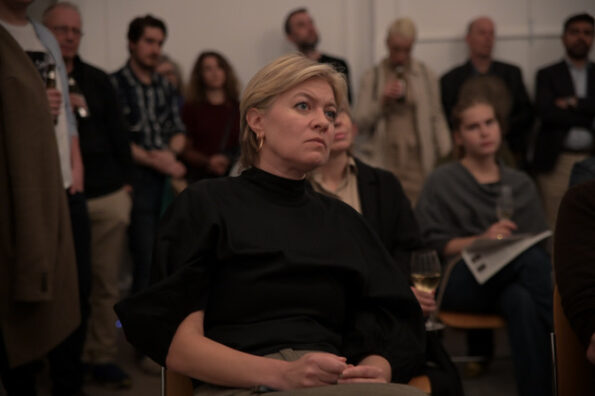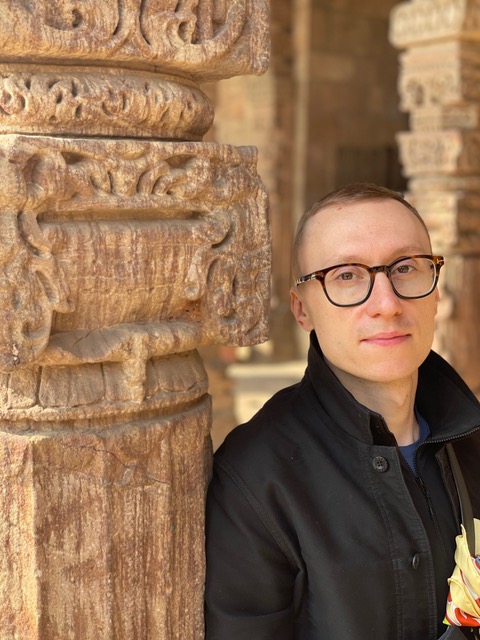Search
To search for an exact match, type the word or phrase you want in quotation marks.
A*DESK has been offering since 2002 contents about criticism and contemporary art. A*DESK has become consolidated thanks to all those who have believed in the project, all those who have followed us, debating, participating and collaborating. Many people have collaborated with A*DESK, and continue to do so. Their efforts, knowledge and belief in the project are what make it grow internationally. At A*DESK we have also generated work for over one hundred professionals in culture, from small collaborations with reviews and classes, to more prolonged and intense collaborations.
At A*DESK we believe in the need for free and universal access to culture and knowledge. We want to carry on being independent, remaining open to more ideas and opinions. If you believe in A*DESK, we need your backing to be able to continue. You can now participate in the project by supporting it. You can choose how much you want to contribute to the project.
You can decide how much you want to bring to the project.

An independent cultural institution focusing on a particular study area must scrutinise and criticise power. When the question is the history, present and future of a specific geography and its cultures, to which a state holds sovereignty, the association of it with the institution is almost inevitable. The prejudice and stereotypes associated with the state are passed on to the institution — disregarding its formal non-affiliation. In popular thinking, culture and the state are synonymous, and the state acts as a primary champion of the former. The tensions are sky-high when the state in focus launches an illegal full-scale invasion of the neighbouring country.
This was the context in which Pushkin House, an art and cultural centre in London focused on the legacies of Russian and Soviet imperialism, found itself in February 2022, when Russia launched a full-scale invasion of Ukraine. The artistic and cultural institution rulebook was thrown away — the only task is not to fall into the abyss, trapped between the Scylla and Charybdis of ‘double cancellation’ — perceived in a simplified binary as friend to foes and foe to friends. When the independent institution is under attack for ‘sharing’ the culture with the state while being the core point of scrutinising its ‘monopoly’ on culture, it is essential to remember the fundamental question — cui bono?*
*who benefits? (Latin) — used by Cicero in Second Philippic and Cassius before him.
Denis: What is Pushkin House?
Elena: Pushkin House is a fascinating and multi-layered construct. It has always been independent and never affiliated with the Soviet or Russian government. It was founded as a residential home for international students by Maria Kullman and her husband Gustave Kullman, Deputy High Commissioner for Refugees in the League of Nations and later in the United Nations (he was one of the fathers of the Nansen passport). It became known as the “Pushkin Club” – a social group of enthusiasts of Russian culture, mostly of British origin, led by Maria, who got together in the evenings to talk about Russian literature and listen to lectures on theology, music and arts. The name derives from the slogan “Pushkin is our everything”, which was subconsciously inherited from the cult of Pushkin initiated by Stalin in 1937, which penetrated the Iron Curtain. Maria was a real tour de force – legendary dancers such as Serg Lifar and Tamara Karsavina, philosopher Isaiah Berlin, and artists Sergey Makovsky and Mstislav Dobuzhinsky were frequent visitors, and the moment the opportunity arose Maria opened up Pushkin House for cultural exchange with the Soviet poets and writers Vera Inber, Agniya Barto, Korney Chukovsky and Alexander Tvardovsky. Soviet bureaucrat Aleksey Surkov and Baron Meyendorf, who served in the tsarist Duma, would meet at the Pushkin Club – it was indeed the only place in the world, at the height of the Cold War, where a public meeting of representatives of such different backgrounds and destinies could take place. Maria was severely criticised by the Russian Orthodox Church abroad for her open-mindedness. Still, she stood her ground, maintaining that establishing a direct dialogue is much more valid than reading propaganda (Soviet or Western).
After Maria died in 1965, Pushkin House operated as an umbrella organisation with a series of spontaneously run projects. This resulted in fragmented programming, leading to fragmented audiences and a distorted perception of the organisation. My predecessor Clem Cecil made an effort to solidify it, and, as we learn from the history of Pushkin House, it is very important, almost crucial, to create continuity and stability. This involves analysing the institution’s identity, especially its blind spots, and understanding its position with other social institutions and its interactions and relations with its stakeholders.
You also need to be able to dig deep into the institutional memory of the organisation, as often it becomes mythologised, and removing this layer by layer takes not only time but quite a lot of stamina and determination as you are faced with resistance which is not necessarily straightforward or justified in the current context, but is engrained in the walls of the organisation. I think Charles Escher once said that only when everyone starts telling you that you are destroying the institution, that’s when you know that you are actually achieving something.
Denis: How is Pushkin House funded?
Elena: Pushkin House is an independent organisation, and its main sources of income come through fundraising, venue hire, ticket sales and a tiny endowment (although it’s not really an endowment in proper fundraising terms) which resulted from the sale of our previous building in Ladbroke Grove. Cultural organisations in the UK are being hit with severe budget cuts, and our situation is even more precarious as on top of the economic consequences of Brexit and the pandemic, we are faced with the war, reverberations of sanctions, and other consequences. So the work has to be meaningful first of all to our visitors, who are gradually becoming our collaborators and supporters.
Denis: What changes have you envisioned and how that vision transformed with the mounting external challenges?
Elena: We have initiated a lot over the last two years – on the level of governance, staff, operations, programming, audiences, and the building itself – and hopefully, all these processes will continue when we move on. It is a work in progress, and this will never end as times change, contexts change, and we can discuss in detail where we currently stand on this trajectory. All stakeholders contribute to this slow but gradual transformation of the organisation into an institution through programming, visitor engagement, engagement with different communities, visual identity, our bar and bookshop, and fundraising strategies. Our discursive programme is a logical continuation of this change.
For cultural organisations, there is always a dilemma of engagement or disengagement; for example, Pushkin House chose not to engage with the annexation of Crimea in 2014, and the staff were instructed to give no comments on this “political” matter. After February 2022, we felt that we did not have that option. With Russian cultural organisations cut off from the polemics, many grassroots organisations in Russia with whom we worked previously being forced to close down, change their format or reverse the nature of their work, and with many cultural workers dispersed all over the world, we had no choice but to continue. But of course, it was not business as usual, and we had to completely rethink our programme and operations.
Denis: It must have felt utterly disorienting.
Elena: Since the Russian war in Ukraine started, Pushkin House has remained active and directly engaged despite apparent challenges. Amidst political calls for cultural cancellations, bomb threats, hate mail and alienation in international professional circles, we had to deal with the monstrous fact that Russia invaded Ukraine, which affects all of us personally. You don’t have textbooks on how to work in a context when the country whose culture the institution “represents” bombs another country.
Due to close personal and professional ties with Ukrainians, elevated levels of sensitivity, being open to direct dialogue and communication, not hiding away from difficult questions, and going far beyond what our professional responsibilities required, not only have we survived as an organisation, but we have come out more robust, more focused and with a much more nuanced understanding of what constitutes a contemporary cultural institution which is tasked with the extra burden of operating outside the cultural environment that it is supposed to promote, and which by default becomes guilty of the Russian government’s crimes. This was unprecedented, but we had to learn on the go.
Over the last three years we have been focusing on the critical re-examination of Russian history, supporting those affected by Russian military aggression, the Russian Empire or Soviet Union, and giving a platform for them to respond with their stories and experiences as we continue to deconstruct Russian culture. But real change and decolonisation of ourselves come at a cost. Frustration, misunderstandings and disagreements accompany it as you have to unlearn many things ingrained in you. It brings a very strong feeling of uneasiness, but a new, meaningful transformation can occur only from this feeling.
Denis: Since the start of the war, there are strong calls for ‘cancellation’ of the Russian cultural figures, including Pushkin. Did you address this subject as an institution?
Elena: We are acutely aware of the discomfort, trauma and even hate that our namesake generates among Ukrainians, and not only them. Putin is not the first one to instrumentalise culture; before him, Stalin did precisely the same, and in the 200 years since Pushkin’s death, depending on the regime, he has been proclaimed a monarchist, anarchist and revolutionary – you name it. Yet we feel that as long as the war continues we have to stick to this name, and the responsibility of living with this identity that we inherited and are re-examining. Otherwise, it all just becomes a shallow rebranding exercise.
Denis: In the context of constant uncertainty, the question of the future is rather daunting. But still, what do you see on the horizon?
Elena: We are slowly developing a new ethos of operating as a new reality imposes new rules. You are now constantly considering uncertainty and are mentally prepared that, despite all your best endeavours, signed contracts and agreements in place, the project might not happen. There has always been an element of precariousness around art and culture, but never as much now – artists are traumatised, audiences are polarised, relationships are tenuous, and funding is volatile. You must maintain a certain degree of dedication and increased commitment to operate in this climate.
If anything, I am really proud of how we have managed to attract different people from very diverse cultural backgrounds, who over three years, developed a sense of ownership of Pushkin House, who think of the house as their own, and who share their experiences on the themes of migration, displacement, conflict and trauma. What we have realised since the beginning of the war is that our audiences do not perceive us as an exhibition space or chamber music hall but as a space to be together, a space to meet and exchange ideas, and, as one of our contributors said, a “space for self-expression and the struggle”. I hope we will continue on that trajectory.
(Cover photo: Elena Sudakova, director of Pushkin House © Ivan Dikunov)

Denis Maksimov is an art historian and cultural critic. He is a Foyle Curator of Exhibitions and Public Programming at Pushkin House and a Lecturer at the Institute of Contemporary Art. He runs the Lecture Performance Archive, an interdisciplinary research project, and co-founded Avenir Institute, an artistic think tank.
"A desk is a dangerous place from which to watch the world" (John Le Carré)